Sustainable development
VINCI Airports' global Environmental Strategy

OUR COMMITMENT
VINCI Airports goals
The airports operating within the VINCI Airports network are committed to an ambitious and defined environment transition path while sustainable ecological transition is currently in progress at all airports managed by the group. This approach encompasses the entire airport ecosystem and is implemented in cooperation with local and international partners.
The environmental strategy of VINCI airports - AIRPACT 2030 - sets forth three main priorities:
- Act for the climate
- Preserve natural environments and biodiversity
- Optimization of resources through circular economy
In 2016, VINCI Airports defined a global Environmental Strategy aiming to achieve zero emissions for the net zero emission for the entire network by 2050, the first such strategy to be set forth for international airports around the world.
The key objectives of the Environmental Strategy are the protection of biodiversity and natural environments, control of water consumption, waste recycling, reduction of electricity consumption and use of renewable energy.
The goals of the Environmental Policy to be executed by 2030 are:
- Protect biodiversity
- Zero pesticides
- Halve water consumption (average water consumption per passenger)
- Zero waste to landfill
- Halve carbon footprint
- % ISO 14001 certification - Environmental management system
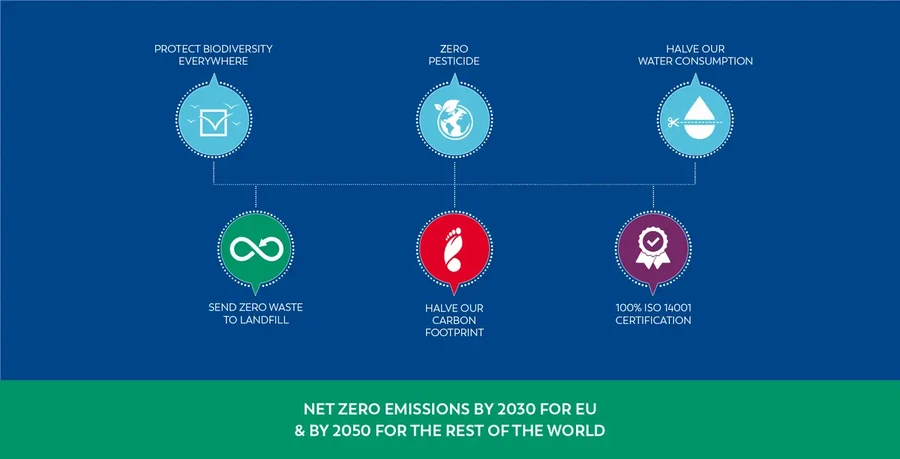
Belgrade Airport goals
Environmental management policy
In reference to environmental protection management, the company operates in accordance with the national regulations and legal framework, principles and targets set forth by the VINCI Airports group, standards defined by Senior lenders, as well as best industry practice.
Environmental strategy
Pursuant to VINCI Airports Environmental Strategy and Policy for the year 2022, Belgrade Airport has established a Sustainability Strategy called the "Green Pyramid”.
The "Green Pyramid" consists of 12 blocks that include key areas of environmental protection and social issues, adhering to the obligations set forth by the national legislation, the requirements of the VINCI Airports group, as well as the guidelines established by the international financial institutions and examples of best industry practice.
The scope and content has been defined for each block of the "Green Pyramid", the priority activities for the improvement of the environmental factors related to a specific block have been set leading to corresponding action plans.
The blocks of the "Green Pyramid" strategy are:
- Management of environmental aspects
- Infrastructure management as per the environmental aspects
- Sanitary and hygienic measures
- Biodiversity
- Managing the quality of water, soil and air
- Managing the greenhouse gas emissions
- Energy efficiency
- Managing hazardous materials
- Waste Management
- Noise management
- Socially responsible business
- Initiatives focused on further improving the environmental protection
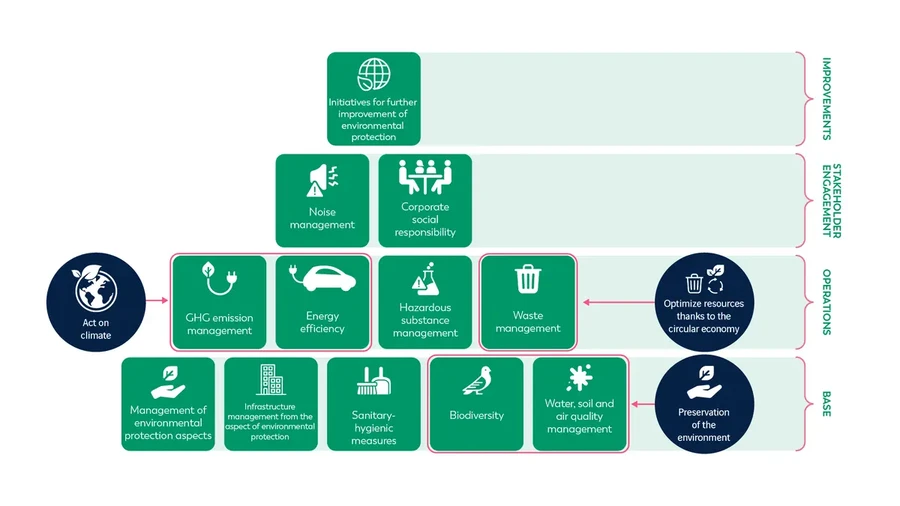
Key areas
Waste Management
The waste management policy is highly important and is aligned with the objectives focused on by the VINCI Airports network.
Our policy focuses on:
- Reducing generated waste
- Increasing the amount of recycled waste through collection, segregation and delivery to authorized waste management operators
- Active promotion of circular economy
- Monitoring hazardous waste handling from the moment of generation to final disposal by authorized operators
- Reaching the goal of “Zero waste to landfill” by 2030.
Waste-water management and water quality
One of the key goals of Belgrade Airport is sustainable water management with the ambitious goal of halving water consumption per passenger at the airport complex by 2030.
Managing the drinking water quality
Airport’s water supply system is connected to the network of the facility located on the left bank of the Sava River classified as the first "outlet zone". Belgrade Airport conducts regular inspections of drinking water quality pursuant the Environmental Monitoring Plan and regulations governing this area.
Waste-water management
One of key areas currently in focus is to adequately manage waste water (atmospheric waste-water, sanitary waste water and faecal sludge and aircraft waste water). In order to reduce the risk of groundwater and surface water pollution, several measures for the purification of waste water (atmospheric and sanitary-faecal), as well as the use of rainwater, were implemented within the Airport reconstruction project.
The collection and treatment of waste water by Belgrade Airport has been improved by the implementation of the following measures:
- By operating the plant for the processing of sanitary and faecal waste water(WWTP) located at the airport complex.
- Reuse of purified waste water from the sanitary-faecal waste water treatment plant, for irrigation of green areas
- Installation of grease and oil separators for atmospheric waste water generated at manoeuvring areas
- Collecting rainwater from the roof on the new sections of the terminal and reuse of rainwater in toilets
Groundwater management
Quality of groundwater is monitored at 8 locations within the airport complex where potential pollutants may enter into groundwater system.
Points where measurements are conducted - monitoring wells - are located near locations on the airport complex that are recognized as potential polluters (de-icing platform, airport fuel storage, transformer station, NIS fuel storage, closed waste landfill).
Soil management
Quality of soil is analysed in order to identify sensitive and overloaded areas, to establish a database on the degree and characteristics of contamination, as well as the types of pollutants present. Soil contamination can be local (point source) or diffuse- through atmospheric and underground water. Improper disposal and accidental release of toxic and dangerous substances, mainly due to work related activities, leads to soil pollution. Sampling is currently being carried out at the airport complex on the location of the transfer station.
Ambient air quality management and air pollutant emissions
Air pollution is the presence of chemical, physical or biological agents in the air (either atmospheric or indoor) which change the natural characteristics of the air.
The most common activities that lead to emissions of pollutants into the air are: combustion of fossil fuels in the process of obtaining electricity, products of fuel combustion in motor vehicles, various technological processes, disposal of garbage in landfills or burning of agricultural crops, aircraft during landing and take-off, fumes from fuel storage and fuel handling, etc.
Monitoring of ambient air quality is conducted twice a year at 4 locations on the wider airport complex.
Biodiversity management
In the previous period and pursuant to VINCI Airports Environmental Policy, Belgrade Airport undertook the following initiatives to preserve and improve biodiversity:
- In the course of 2022 and 2023, honey plants (lavender) were planted at several locations, thus greening the area and and assisting in preservation of bees
- beehives were also placed within airport complex
- a protective net was installed as to prevent birds entering into areas where air operations are in progress
- treating protected species caught within the airport complex pursuant to good practice and in cooperation with competent institutions
- greening the areas around the airport complex in 2023
Ecological facilities
Since 2020, significant funds have been invested in infrastructural projects focused on modernizing, expanding and reconstructing the airport, strongly emphasising the projects having a direct impact on improving and protecting the environment.
New facilities have been constructed: a modern heating plant, a solar power plant, LED lighting was installed throughout the airport complex, two plants for collecting and segregation of generated waste, as well as the plant for the treatment of sanitary/sewage waste water.
New heating plant
A new heating plant using 44 MW natural gas replaced the old plant which was fuel oil based. The advantage of the new heating plant is the reduction of environmental impact by using less pollutant energy sources and switching from heavy fuels to natural gas.
The new plant is equipped with a trigeneration system that produces electricity and, in addition, thermal energy used for heating in the winter and for cooling in summer months, jointly with the absorption chillers. This system increases heating efficiency by approximately 25% and reduces carbon footprint by 25%. This power plant enables Belgrade Airport meet more than 70% of its electricity needs from its own sources.
The new power plant, which became operational at the end of 2021, in addition to reducing environmental impact also provides considerable savings due to the use of available natural resources.
Solar plant
Photovoltaic solar system with 2984 modules having the installed power of 1 MWp is located on an area of 15,900 m2.
The solar power plant supplies airport complex with electricity obtained from renewable sources and produces approximately 1,130,000 kWh of green electricity per year, which is comparable to the annual consumption of nearly 430 households. The expected reduction of greenhouse gas emissions is about 10%.
The solar plant is located next to the Tesla car park and was put into operation in 2022.
LED lighting
In the course of 2022 and 2023 measures have been initiated as to improve environmental protection as per the circular economy principles. Current lighting system has been replaced by LED lamps - more than 98% of the lighting within the old terminal and entire system of the new terminal and at new car parks.
140 poles with LED lighting have been installed along the service road in front of the terminal and in the car parks, which use solar energy therefore do not require conventional electrical power from the network. As per the initial projections, solar lighting will reduce the emission of harmful gases by 67,600 kg per year.
Transfer station for waste collection and segregation
The transfer station for the collection and sorting of generated waste and the temporary storage of recyclable waste until it is handed over to authorized operators for recycling, is located in the public zone of the airport /landside, while other such facility is located within the security-restrictive zone/airside.
Transfer station for waste segregation - in the public zone
The waste sorting facility - transfer station located within the landside is furnished with modern equipment for segregations and temporary storage of recyclable waste and was commissioned on September 22, 2022, on the VINCI Environment Day.

The facility is intended for manual sorting of solid, communal and waste generated outside the security restricted zone, according to the type of waste, and for temporary storage in designated containers for recyclable waste until it is handed over to an authorized recycling operator. The non-recyclable residue is handed over for final disposal at the landfill.
Currently, 9 streams of recyclable waste are separated in the waste sorting transfer station: cardboard, PET packaging, cans, glass, foil, tetra pak packaging, paper, hard plastic and metal cans.
Records are kept on the amount of mixed municipal waste entering the facility, the amount of processed and sorted recyclable waste and the of the remaining non-recyclable municipal waste.
Efficiency of municipal waste segregation, i.e. the share of separated waste for recycling in relation to total municipal waste (recycling percentage) per month during 2023 is shown in the graphic below.

Solid waste plant located within the security-restricted zone
The second facility - transfer station was built in the security-restricted zone/ airside and is used for the collection and temporary storage of catering waste from international transport (animal by-products category 1 from aircraft) in a cooling chamber, until handed over for further transport and further handling by an authorized operator registered for performance of such activities under the Veterinary Administration.
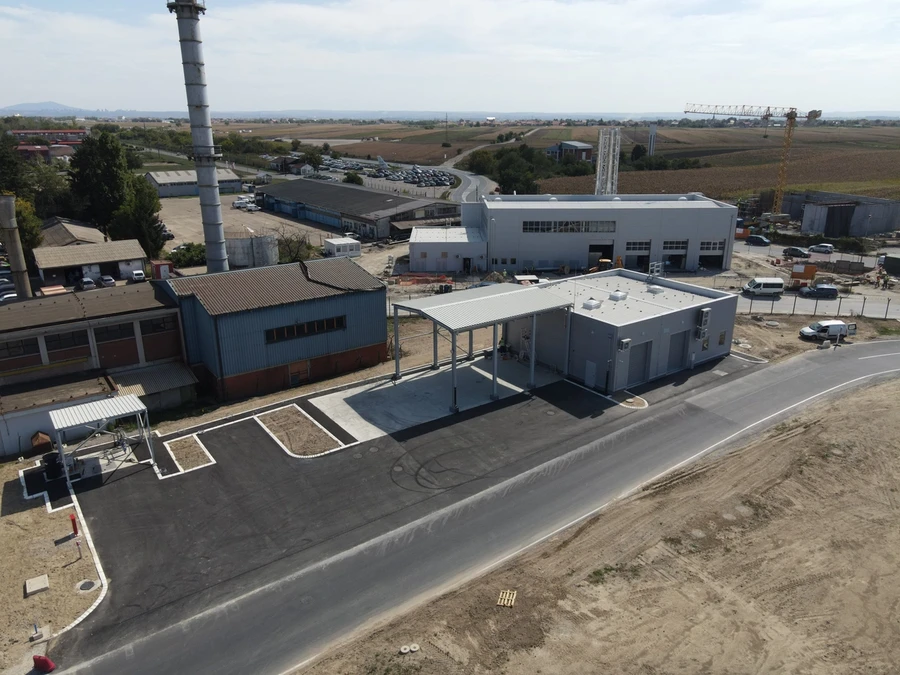
Solid waste plant located within the security-restricted zone
Waste-water treatment facility
The new plant for the treatment of sanitary waste water from the airport complex was constructed in 2023 and final adjustments are currently in progress.
Its designed capacity is 750m3 per day and will treat waste-water of various origins, such as:
- Waste -water from the terminal building
- Waste-water generated by commercial aircraft operations (so-called "blue water")
The project stipulates that portion of the processed water will be additionally treated and used to irrigate green areas within the airport complex, in order to reduce water consumption, all in accordance with the VINCI Airports Policy regarding the rationalization and reduction of water consumption at airports.
Collecting rainwater from the roof of the newly constructed section of the terminal
The initiative to collect and use rainwater represents a significant step forward in the implementation of activities as to achieve the universal goal of halving water consumption by 2030.
In 2022, a rainwater collection system was put into operation as part of the newly constructed Pier C, which allows the collected technical water to be used in the toilets after it has been treated, in the newly constructed section of pier C from C7 to C14.
Filtration and disinfection is carried out thus enabling use of rainwater for technical purposes,
This innovative measure of improvement in water management will significantly contribute to reducing the consumption of sanitary water from the city's water supply network and represents a model of sustainable business based on principles of circular economy .
ISO standards
In 2023, Belgrade Airport completed the recertification process according to ISO 9001:2015 - Quality management system, ISO 14001:2015 - Environmental management system and ISO 45001:2018 - Occupational health and safety management system. Regular audits of ISO 50001:2018 - Energy management system, ISO 27001:2013 - Information security management system and ISO 20000-1:2018 Service management system have been completed.
In 2024, Belgrade Airport was certified according to ISO standards 9001:2015 Airport management and passengers, baggage, cargo and mail ground handling, ISO 14001:2015 Airport management and passengers, baggage, cargo and mail ground handling and ISO 45001:2018 Management airport and passengers, baggage, cargo and mail ground handling.
ISO 9001 270115 (1.44 MB)
ISO 14001 270115 (1.42 MB)
ISO 45001 270115 (1.45 MB)
This enabled the company to fully implement the Integrated Management System (IMS), incorporating all the above business systems into one comprehensive management system for the entire company.
Obtained certificates as per the above standards, along with regular supervisory audits, confirm company’s and the commitment of all its employees to provide highest level of service, to preserve data security, energy efficiency, continuous improvement of environmental policies and commitment to providing a safe and efficient working environment.
The certification was conducted by Bureau Veritas (a French certification company), holder of the international permit for ISO certification, which also certifies other French airports members of VINCI Airports network .
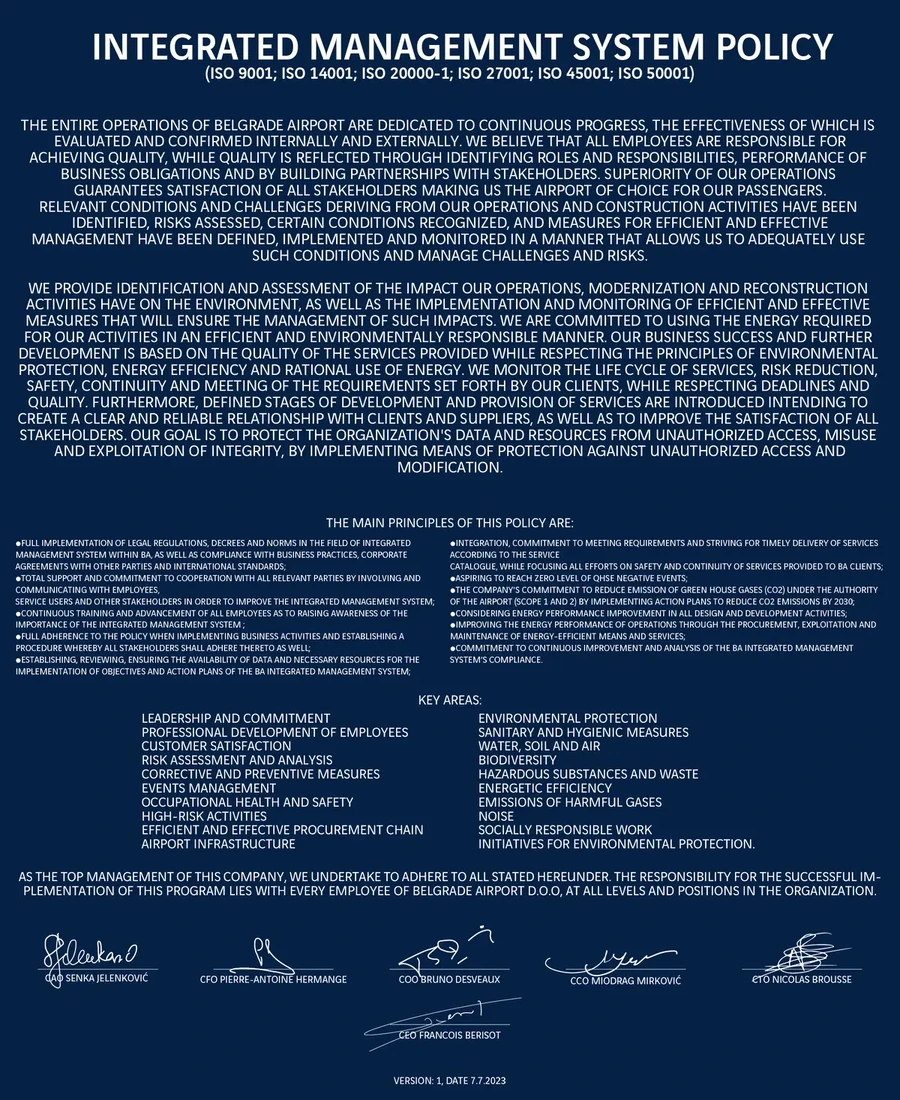
Certificates and accreditations
ACI ACA
In the course of 2022, Belgrade Airport's commitment to preserving the environment through innovation has been recognized by the Airport Council International (ACI), therefore at the beginning of 2023 the airport was awarded a level 2 certificate in the accreditation program for the management of carbon dioxide emissions at airports (Airport Carbon Accreditation - ACA ) which was renewed in 2024 having a term of validity until November 23, 2024.
Thanks to the implemented energy efficiency solutions, as well as important initiatives involving stakeholders focused on reducing the negative impact on the environment, Belgrade Airport will reapply in 2024 for the level 3 carbon footprint accreditation for airports.
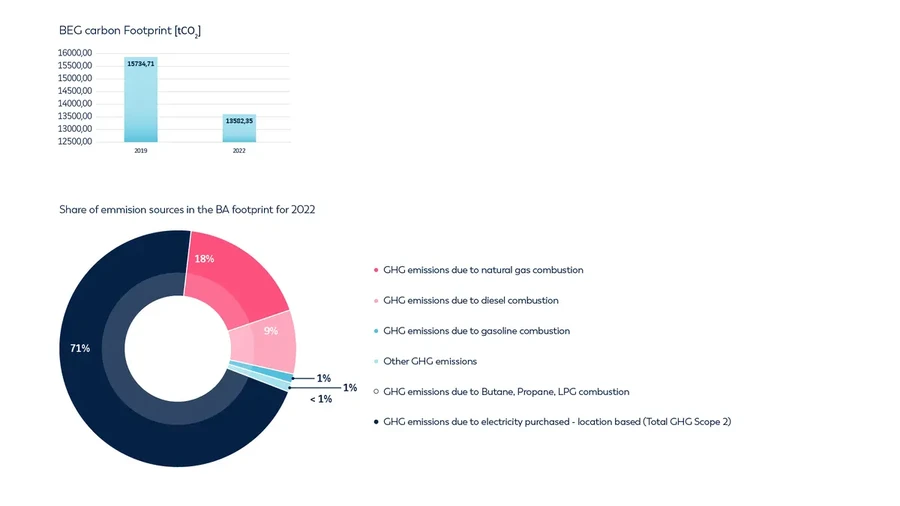
ACI AHA (PHSRA)
ACI has also awarded Airport Health Accreditation to Belgrade Airport for 2021 and 2022.
In 2023, ACI has accredited Belgrade airport for a new, more demanding and complex protection program - Health Accreditation for Public Health and Safety - PHSRA (Public Health & Safety Readiness Accreditation).
ACI service quality awards
In 2021, the airport received an award for the quality of airport service provided for the year 2020 in two categories: the best airport by size and region (5 to 15 million passengers per year in Europe) and the airport implementing highest level of hygiene measures in the region (Europe).
Within the Airport Service Quality Program (ASQ) for 2022, BEG has received awards in three categories: Best airport by size and region - 5 to 15 million passengers per year in Europe, airport with the most dedicated staff and the most enjoyable airport in Europe.
In 2023, for the third year in a row, the airport was chosen by passengers as among the best in Europe in its category. A record 4 Airports Council International (ACI) awards, within the Airport Service Quality program:
- Best airport of 5 to 15 Million Passengers in Europe
- Airport with the Most Dedicated Staff in Europe
- Most Enjoyable Airport in Europe
- Cleanest Airport in Europe
Local community
Aircraft noise management
Belgrade Airport is committed to cooperation with the local community and recognizes that living near the airport or the flight path can cause the sound and visual effects produced by the aircraft, i.e. side effects and events related to aircraft operations, to be more evident. It is our intention to involve each interested party, through transparent communication and cooperation, thus becoming our partner in solving possible issues related to noise management.
Belgrade Airport has adopted the final version of the Environmental Noise Protection Action Plan for the period 2025-2030 for "Nikola Tesla" Airport Belgrade, following the approval from the Ministry of Environmental Protection dated June 5, 2025.
Citizens, experts, and interested parties can review the documentation via the provided link:
gd-1313-2025-akcioni-plan-za_tite-od-buke-u-ivotnoj-sredini-belgrade-airport_compressed.pdf (16.59 MB)
As per the applicable Air transport Law, when an airport handles more than 50,000 take-offs and landings per year, it is obliged to establish continuous aircraft noise monitoring.
Belgrade Airport has established a system for 24/7 monitoring noise and flight directions , in order to enable monitoring and management of environmental impacts, in accordance with the international standard ISO 20906.
The noise monitoring system consists of several noise monitoring stations continuously monitoring noise levels (microphones) and one portable station. The noise monitoring stations are connected via ADSL to the server platform. This server also receives operational data, including radar data on the type of aircraft movement and relevant aircraft operator data.
There are currently 5 fixed units and 1 portable unit installed, which are located as to cover the area considered to be at risk from aircraft noise.
The aircraft noise management is an issue of importance to multiple internal and external organizations. First of all, the issue of noise management is important for the Republic of Serbia, the competent Ministry of Environmental Protection, the Environmental Protection Agency, all in accordance with the Law on Environmental Noise Protection (Official Gazette of RS, No. 96/2021 ("Official Gazette of RS", No. 96/2021 ).
Directive 2020/49/EC on the assessment and management of environmental noise has been implemented to a larger extent in the Law on Protection from Noise in the Environment ("Official Gazette of the RS" No. 96/21), and it requires drafting a Strategic Noise Map for the main airport, main roads and railways on the territory of the RS, as well as stipulating that legal entities being the owners and concessionaires of the above infrastructure shall be responsible for creation of such document jointly with other entities involved in the environmental protection. Strategic noise maps should be created using the assessment method recommended in Annex II of the END Directive as specified in EU Directive 2015/996.
Strategic noise maps shall be reviewed and, if necessary, revised every five years as of their drafting/creation date and shall represent the basis for the development of relevant action plans as well as a method of informing the public about the level of environmental noise and harmful effects thereof.

WebTrak - Aircraft noise monitoring application
The online flight tracking application WebTrak enables automatic submission of suggestions/requests/complaints in the event that our fellow citizens, users or partners consider that the level of aircraft noise is above normal values, which may occur if the aircraft deviates from its flight path during arrival or departure from the airport .
In the course of 2022, the "WebTrak" application became publicly available for all interested parties, and in this way a transparent, free and accessible complaint mechanism was implemented by which citizens' complaints will be recorded and resolved.
What does WebTrak offer?
Data on noise exposure and flight paths
It displays real-time data or historical information about individual aircraft taking off or landing at Belgrade Nikola Tesla Airport, with details about the aircraft type, flight altitude, as well as input data for noise monitoring relevant to a specific flight and further noise protection management activities.
An independent investigation/research
It allows the public to obtain information on what is happening in the airspace around them.
Submission and processing of suggestions/requests/complaints
Simplifies the submission and processing of noise-related suggestions/requests/complaints using an automated form which can be submitted from a computer or mobile device.
Received proposals/requests/complaints are processed and if it is established that the noise level of the registered aircraft is exceeded, the specific flight is reported to the competent institutions.
Archive of reports
Creates and saves reports on environmental noise on the server of Belgrade Airport.
To help you navigate the new online application, we have prepared few instructions on how to use the WebTrak and understand how aircraft tracking practice can help Belgrade Airport adequately process your suggestions/complaints/requests and respond thereto. See the instructions here.
LIABILITY DISCLAIMER : We hereby inform you that the WebTrak system supports the option of a request for the exemption of specific flight data (relevant criteria: requests issued by competent bodies, regulatory requirements and events related to emergency situations).
Dialogue with the local community
Belgrade Airport recognizes social responsibility as a highly important business segment and respects social issues, environmental protection, business ethics and philanthropy as key elements in the development of the local community.
The company's socially responsible policy is aimed at empowering the local community and supporting the development of institutions such as health centres, schools, local theatres, humanitarian organizations and associations.
Communication with members of the local community is one of the main pillars of socially responsible behaviour. Communication with citizens most often takes place through emails, online suggestion forms or other applications that include surveys, comments and other methods of collecting data on the community members viewpoint as well as meetings.
Communication with representatives of local communities and institutions also takes place at meetings of the ESAC - Environmental and Social Advisory Committee, where stakeholders representatives - from representatives of local neighbouring communities to representatives of state institutions and airlines. Various important issues faced by the community are discussed at ESAC meetings , as well as suggestions and advice for improvement.
The Committee has a president, secretary, regular members, substitutional members (deputy members), as well as external specialists and associates. Meetings are held periodically, as agreed by participating parties
Our responsibilities
Socially responsible business and partners
Belgrade Airport's support and its socially responsible campaigns are focused on various social issues, such as the empowerment of marginalized or vulnerable groups, poverty reduction, protection of biodiversity and the environment, support for cultural events and education, health protection and various sport activities that have a socially responsible character.
Assisting and supporting us in the above related activities are our partner: organization Lice Ulice, associations “Cap for handicap’’ , Evo ruka, Nurdor, Society for the Protection and Study of Birds of Serbia, UNICEF, Divac Foundation, Caritas, French-Serbian Chamber of Commerce, Forum for Responsible Business, Serbia Business Run.
The company cooperates with the organization Lice Ulice by subscribing to monthly issues of their magazine and by providing space within the airport complex where hereof magazine is sold.
By participating in the "Race for Forests" within the "Belgrade Business Run” project, Belgrade Airport employees planted trees at various locations in Serbia.
The French-Serbian Chamber of Commerce has initiated a socially responsible project which included primary schools - "Do something drastic to make trash fantastic".
Belgrade Airport has supported the Society for the Protection and Study of Birds of Serbia by purchasing their products later used at the „Environmental Day”, an event organized by the company.
For several years now, our employees have been helping to prepare winter preserves jointly with parents from the association "Evo ruka", an association actively engaged in developing an inclusive society and the creation of a sustainable support system and safe environment for children with disabilities and their families.
In cooperation with the organization "“Cap for handicap’’ boxes for collecting plastic caps have been placed within the terminal and around offices. Donation boxes of the humanitarian organizations UNICEF, Divac Foundation and Caritas have been placed at different locations within the airport complex.
Voluntary blood donation of employees is organized in cooperation with the Clinical Hospital Zemun.
By purchasing New Year greeting cards from the humanitarian organization NURDOR, we provided assistance and support to this association established by parents of children suffering from cancer.
In cooperation with the Responsible Business Forum, our company participated in the recruitment campaign "Tailored Job” which focused on employment of persons with disabilities.
Environmental policy
Socially responsible business and partners
VINCI Airports has defined a global and ambitious environmental policy and targets for all its airports, in the knowledge that such an approach is essential for long-term sustainability and competitiveness. In the context of VINCI Airports environmental and social policy and the local circumstances BELGRADE AIRPORT has established Environmental and social policy and Occupational health and safety policy, and management system, to manage relevant aspects at the airport and to ensure its own and the corporate policies and strategies execution.
Integrated System Management Policy (1.08 MB)
Significant part of the ongoing reconstruction and modernization project at Belgrade Nikola Tesla Airport are environmental and social enhancements, the major one among other being construction of:
- New heating plant
- Waste management facility - land side
- Waste management facility - air side
- Photovoltaic plant
- Wastewater treatment facility
BELGRADE AIRPORT has performed Environmental and Social Impact Assessment and summary of its results and mitigation measures are given in the following document:
Environmental and social impact assessment - non-technical resume (1.92 MB)
Stakeholder’s Engagement Plan (2.81 MB)

VINCI Airports continues its decarbonization actions in Europe and worldwide and reaffirms its objective of achieving net zero emissions throughout its network by 2050
Decarbonisation actions
BELGRADE AIRPORT continues its decarbonization actions and reaffirms its objective of achieving net zero emissions
On the occasion of the second ACI EUROPE summit on the sustainability of aviation and as part of the airport sector's joint commitment currently subscribed to by 235 European airports, BELGRADE AIRPORT, member of VINCI Airports network is reaffirming its objective of achieving net zero emissions throughout its network by 2050.
As the first airport operator to commit to an international environmental strategy in 2015, VINCI Airports is multiplying its actions to be exemplary in reducing its own CO2 emissions and to contribute to reducing air transport emissions, which represented 2.8% of global emissions in 2019. VINCI Airports is thus deploying concrete and immediate solutions that limit the impact of airports, which have already reduced the network's carbon footprint by 22% between 2018 and 2020.
To reduce energy consumption, several levers are used: energy audits and deployment of energy management systems, replacement of traditional lighting with LEDs, renewal of heating/air conditioning equipment with more efficient appliances, or optimization of temperature settings or lighting.
In the same time, VINCI Airports is working to decarbonize the energy it consumes by, for example, producing its own solar electricity, with 17MWp already installed on its network, including 8MWp of green energy added in 2020 despite the crisis, or by renewing its technical vehicle fleets to switch to electric power.
VINCI Airports is also the first international airport group to have committed 100% of its platforms to the voluntary Airport Carbon Accreditation (ACA) program of the Airports Council International, the only international greenhouse gas emission reduction program specific to airports. 24 airports have already reached level 2, which attests to an effective and sustainable reduction in CO2 emissions. Lyon-Saint Exupéry and London Gatwick airports have already received 3+ accreditation for carbon neutrality, and Guanacaste airport in Costa Rica has been recognized as carbon neutral by the NGO EARTH University. In Brazil, Salvador Bahia Airport was named the country's "most sustainable airport" in 2019 by the National Civil Aviation Agency (ANAC).
The next objective is to achieve carbon neutrality for all airports by 2030, followed by "zero net emissions" by continuing decarbonization actions and absorbing residual emissions through forest carbon sinks.
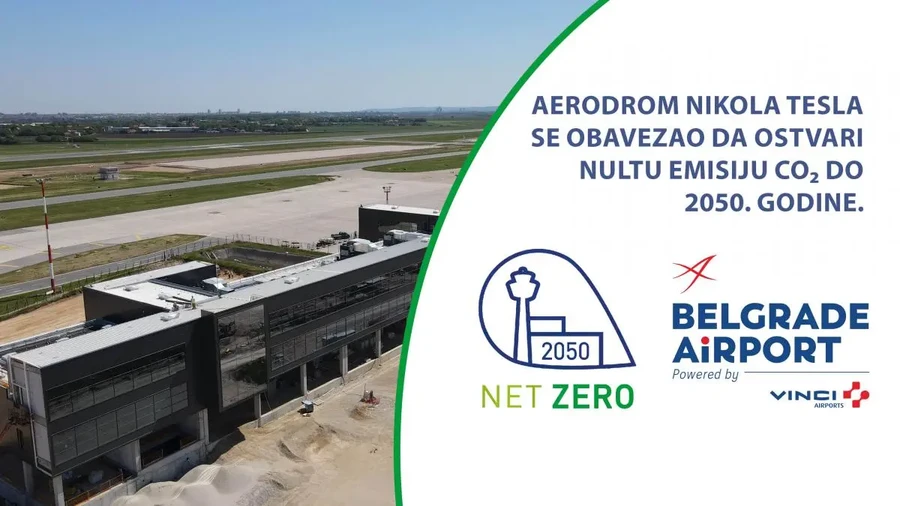
Aircraft noise monitoring application
BELGRADE AIRPORT d.o.o. is committed to fostering cooperation with the local community and understands that living near the airport or the flight path can intensify impact of sound and visual effects of aircraft flight or effects and events related to the flight. It is our objective that each stakeholder, through transparent communication and cooperation, shall become our partner in solving possible issues related to noise management.
The online flight tracking application WebTrak enables automatic submission of suggestions/requests/complaints in the event that our fellow citizens, users or partners consider that the level of aircraft noise is above normal values, which may occur if the aircraft deviates from its flight path during arrival or departure from the airport.
What does WebTrak offer?
Data on noise exposure and flight paths
It displays real-time data or historical information about individual aircraft taking off or landing at Belgrade Nikola Tesla Airport, with details about the aircraft type, flight altitude, as well as input data for noise monitoring relevant to a specific flight and further noise protection management activities.
An independent investigation/research
It allows the public to obtain information on what is happening in the airspace around them.
Submission and processing of suggestions/requests/complaints
Simplifies the submission and processing of noise-related suggestions/requests/complaints using an automated form which can be submitted from a computer or mobile device.
Archive of reports
Creates and saves reports on noise in the environment, on the server of BELGRADE AIRPORT d.o.o.
To help you navigate the new online application, we have prepared few instructions on how to use the WebTrak and understand how aircraft tracking practice can help Belgrade Airport adequately process your suggestions/complaints/requests and respond thereto. See the instructions here:

